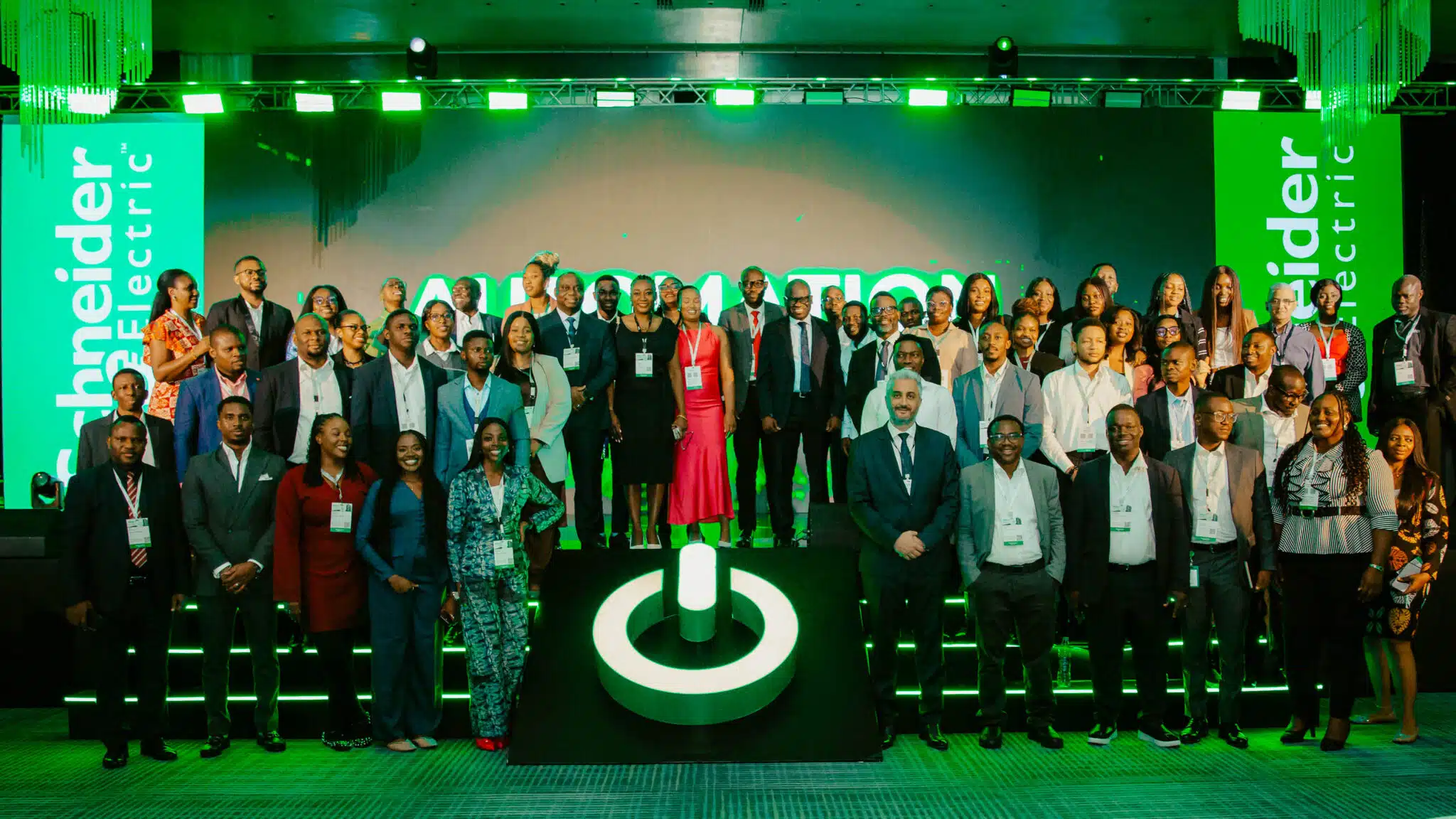Global energy technology leader Schneider Electric hosted its Innovation Day Nigeria 2025 in Lagos under the theme “Competitive Advantage Through Automation and Sustainability.”
The event gathered over 400 customers, 70 C-level executives, senior government officials, and business leaders to explore how digital innovation can accelerate Nigeria’s energy transition and industrial growth.
Key participants include Adebayo Adelabu, Honourable Minister of Power, Folake Soetan, CEO, Ikeja Electric, Dr. Mustapha Abdullahi, Director General & Chief Executive Officer, Energy Commission of Nigeria; Laurent Favier, Consul General of France in Nigeria; Anita Otubu, SEforAll, Senior Director, Universal Energy Facility (UEF), including top Schneider Electric executives such as Walid Sheta, Zone President, Middle East and Africa, and industry experts from the private sector, academia, and the media. The gathering demonstrates the company’s continued collaboration with government and private institutions to drive progress in energy access, efficiency, and sustainability in Nigeria and Africa.
In his welcome address, Ajibola Akindele, Country President of Schneider Electric for English-Speaking Africa, highlighted the company’s impact in electrifying, automating, and digitizing 95% of Nigeria’s energy sector, thereby powering critical infrastructure and advancing industrial automation across the country.
“In the year 2000, we began with just one employee. Twenty-five years later, we have grown to over 200 employees, supporting critical infrastructure across key sectors, including energy, power and grid, data centers, buildings, telecommunications, and manufacturing.
Today, Schneider Electric electrifies, automates, and digitizes 100% of the energy produced in Nigeria, 95% of the country’s refining operations, and 55% of its food production. In the power and grid sector, our presence is particularly strong—within the Lagos metropolis, there’s a 65% chance that the electrons powering your home or office flow through Schneider Electric equipment.”
Ajibola spoke about the ecosystem behind Schneider Electric’s work, noting the company works with over 400 partners across Nigeria to deliver impactful solutions. As Schneider Electric marks 25 years in the country, the celebration also recognizes these partnerships. Together, they have created more than 3000 jobs and contributed to sustainable progress.
Energy for Education: Empowering the Next Generation
Schneider Electric believes Access to Education is a fundamental human right, highlighting partnerships and impact projects being done in Nigeria to empower young talents in the energy and tech space, including communities.
“Our partnership extends towards communities to deliver impactful projects to them. We have onboarded five institutions to our energy technical training programmes; University of Ibadan, LASTVEB, Federal University of Technology Owerri, Yabatech, and Federal University of Technology Akure, and trained over 13,000 youths in Technical and Energy skills. One of the most impactful projects is the Bonny Multimodal Centre, an educational and testing facility in Bonny Kingdom that enjoys uninterrupted power through Schneider Electric solutions. It delivers clean energy to students, ensuring smooth exam experiences and helping close educational gaps in the community,” Akindele said.
Power and Grid, Policy Reforms, and Collaboration
Adedayo Olowoniyi, representing the Honourable Minister of Power, reaffirmed the government’s continued commitment to collaboration and policy reforms being employed to reposition Nigeria’s power sector.
“I commend Schneider Electric for its long-standing partnership in Nigeria’s power sector. The government remains committed to supporting innovation and partnerships that drive efficiency, sustainability, and inclusive growth. Over the years, Schneider has shown leadership in advancing energy efficiency, digital automation, and sustainable solutions across industries. The theme is timely as Nigeria and the global economy navigate rapid changes in technology and energy systems, aligning with our national goals for energy security and economic competitiveness.”
Repositioning the Nigerian power sector for sustainability, efficiency, and growth necessitates a multifaceted approach, encompassing legislation, policy reforms, infrastructure development, energy transition, expanded access, local content development, and capacity enhancement. Each element is designed to address structural challenges and attract private investment across the electricity value chain,” he said.
The Four Megatrends Reshaping Our World
Walid Sheta, Zone President for the Middle East and Africa, provided a keynote address outlining the evolution of energy and Schneider Electric’s position in the vision of partnership for all customers and partners in Nigeria.
“Four megatrends are reshaping our world: Energy transition, Digitization and AI, Infrastructure Development, and Global Rebalancing. The transformation towards electricity is becoming increasingly urgent because everyone now acknowledges that the most efficient form of energy is electrical energy, which transmits force from one place to another. Electrification is key in the world of tomorrow to be more efficient.”
- Energy Transition– We are transitioning to electrification, which is now reaching everywhere, from commercial equipment in energy, buildings, and industries, down to homes. Electricity demand is expected to grow by 27% between 2023 and 2030. Battery Storage Capacity must grow from 86GW to 760GW by 2030. In Nigeria, renewable energy makes up about 10% of total power generation, with national targets set at 30% by 2030 and between 40% and 55% by 2060. As each state strives for energy independence, more generation will be required to drive the economic transformation. These global trends are not unique to Nigeria; Africa and Asia are witnessing similar shifts, with West Africa already feeling the momentum of this global transition.
- Digitization and Artificial Intelligence– The adoption of ChatGPT was 70 times faster than that of the World Wide Web, underscoring how rapidly digital technologies are evolving. By 2028, global spending on AI is projected to rise by 168%. In Nigeria, the demand for data centre capacity is expected to double, yet over 60 million Nigerians remain offline, highlighting the growing need for both AI for Energy and Energy for AI. Electrical and automation technologies are now converging with software, services, and sustainability to enable faster innovation and transformation across the energy sector. In partnership with NVIDIA, Schneider Electric is accelerating the development and deployment of AI factories at scale. The EcoStruxure for Data Centres solution, deployed in DATAXION, the first Tier III-certified data centre in Tunisia and North Africa, achieved a 35% reduction in energy usage and a 30% reduction in operational costs.
- Infrastructure Development-There is a growing need to strengthen infrastructure, empower communities, and enhance technical capabilities across key sectors such as energy, transportation, electricity, and roads. This trend is accelerating not only in Nigeria but globally.
As the nation works toward achieving Net Zero by 2060, first-time demand for modern, efficient systems is on the rise. With rapid urban expansion and a projected population increase of more than 50 million, much of Nigeria’s future infrastructure will be built from the ground up. By 2050, India, the Middle East, and Africa together are expected to have a combined population of 1.5 billion, driving a new wave of construction and innovation to meet growing needs.
- Global Rebalancing-Even in an increasingly globalized world, countries are seeking greater control over their data, energy, and autonomy. Around 97% of global supply chain leaders plan to re-engineer their supply chains within the next two years. This shift toward sovereignty is unfolding alongside globalization, reshaping economies and industries. Schneider Electric embodies this evolution by combining global expertise with local impact. The company is recognized as one of the most sustainable in the world while remaining deeply connected to the communities it serves.
Walid spotlighted use cases of Schneider Electric’s EcoStruxure solutions across the trends:
- Eko Atlantic City – Using EcoStruxure for Buildings, Schneider electrified 99% of Eko Atlantic’s electricity, with an initial output of 11kV and the capacity to scale up to 132kV, ensuring uninterrupted energy distribution. This aligns with SDG 11, creating smart energy solutions that support a greener, more resilient Lagos while fostering a community and lifestyle with limitless possibilities.
- Schneider Electric Smart Factory, Lexington, Kentucky, USA – Recognized as an Advanced Sustainability Lighthouse by the World Economic Forum, the factory leveraged EcoStruxure for Smart Factories to achieve a 25% reduction in energy consumption, a 20% reduction in equipment downtime, and a 78% reduction in CO2 emissions using renewable energy credits (RECs).
- EcoStruxure for Power and Grid – National Electricity Company, Senegal
Through Schneider Electric’s EcoStruxure for Power and Grid, the National Electricity Company of Senegal achieved remarkable improvements in operational efficiency. Recovery time dropped from three hours to just three minutes, while average downtime (SAIDI) was reduced from 54 hours to five minutes. The solution also enabled annual energy savings of 10 GWh, equivalent to about €21 million each year.
“By combining digital and electrical solutions, we deliver sustainability at scale. As a focused energy technology partner, we provide hardware and software for energy and industrial automation, driving the automation, electrification, and digitalization of industries, businesses, and homes. This is our vision for the future, creating efficiency and sustainable growth for all,” he said.
One notable part of the event was The Industrial Panel Session, curated by Business Day, which brought together notable speakers to discuss Unlocking Nigeria’s Energy Future: Policy, Innovation, and Investment, examining how government, business, and technology can work together to accelerate the nation’s energy transition.
About Schneider Electric
Schneider Electric is a global energy technology leader, driving efficiency and sustainability by electrifying, automating, and digitalizing industries, businesses, and homes. Its technologies enable buildings, data centers, factories, infrastructure, and grids to operate as open, interconnected ecosystems, enhancing performance, resilience, and sustainability. The portfolio includes intelligent devices, software-defined architectures, AI-powered systems, digital services, and expert advisory. With 160,000 employees and 1 million partners in over 100 countries, Schneider Electric is consistently ranked among the world’s most sustainable companies.





